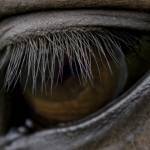How Can Lysine Supplementation Help Treat Equine Herpesvirus Infections?

Lysine is an essential amino acid for horses. In cats and humans, lysine supplementation has been prescribed for the treatment of herpesvirus infections, which can cause keratitis (inflammation of the cornea of the eye) or dermatitis. Shedding of feline herpesvirus in nasal secretions was decreased in cats supplemented with L-lysine, compared to cats that did not receive L-lysine. Equine herpesvirus (EHV) infections are associated with abortion, neurologic disease, respiratory tract infections, coital exanthema, or keratitis. Equine herpesvirus-1 (EHV-1) infections can cause severe neurologic disease, and supplemental lysine has been suggested as a potential preventive or treatment for EHV-1 encephalomyelitis based on its use in other species.
The amino acid arginine is required by herpesviruses for replication. Compared to the proteins that make up the cells of its infected host animal, the proteins produced by herpesviruses contain more arginine and less lysine. Lysine appears to antagonize arginine metabolism by:
- Competing with arginine for reabsorption in the tubules of the kidney. This promotes the loss of arginine in the urine.
- Increasing activity of the enzyme arginase, which breaks down arginine.
- Supplemental dietary lysine competes with arginine for intestinal absorption. The more lysine in the diet, the higher the chance that it will be absorbed rather than arginine.
- Increased lysine competes with arginine for entry into cells, similar to dietary absorption.
In humans, several different doses of lysine have been investigated for the treatment of herpesvirus infections. The success of lysine supplementation depends on the dose administered, the amount of lysine and arginine in the patient’s diet, and how well an individual absorbs dietary lysine.
The average daily maintenance requirement of lysine in an adult, 1100-pound (500-kg) horse is 27.1 grams. Apparent lysine digestibility in horses is reported to range from 64-79%. In horses, a dose of 15 grams of L-lysine by mouth every 12 hours has been suggested for EHV-1 infections. L-lysine supplementation may be beneficial for at-risk horses that have been exposed during an EHV-1 outbreak. The replacement of arginine by lysine in cells is gradual, and lysine supplementation is less likely to be effective in horses that are already showing clinical signs of neurologic disease.
References:
Gaby, A.R. Natural remedies for Herpes simplex. 2005. Alternative Medicine Review. 11:93-101.
Goehring, L.S., and D.P. Lunn. 2009. Equine herpesvirus myeloencephalopathy. In: Robinson, N.E., and K.A. Sprayberry (eds). Current Therapy in Equine Medicine. 6th ed. Saunders, St. Louis, MO. 177-181.








